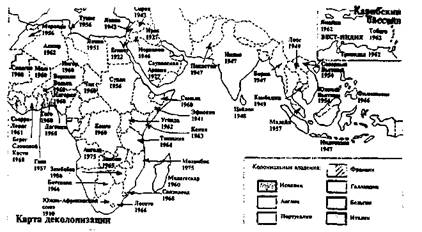home
 Economy Economy
 Books Books
 History of the world economy - Polyak GB History of the world economy - Polyak GB
|
History of the world economy - Polyak GB
31. Economic development of countries liberated from colonial domination
The concept of " developing countries " is conditional - it unites countries that differ significantly from each other but have certain essential features that allow them to be assigned to this group of countries. Otherwise, these countries are called the Third World.
The problem of choosing ways of development after the Second World War, and especially after the end of the collapse of the colonial empires and decolonization, has become common for all countries in Asia and Africa. This opportunity arose because almost all countries and peoples gained political independence and faced with the task of "catching up development" as a global problem for the first time.
31.1. Developing countries as a factor in the growth of the world economy
Developing countries occupy an important place in the world community - they account for about 80% of the world's population and about 70% of its territory. These states are the periphery of the world capitalist economy. They are distinguished by a low level of development of the productive forces, which, in turn, is reflected in the indicators that fix the real economic situation, and depending on the developed industrial countries, and in the continuation of the development of ties in the old model of "finished products - raw materials." Developing countries characterize the multifaceted economy and the duality of the economic structure, which consists in the development of agriculture and crafts, on the one hand, and modern industry, on the other. In all these countries, there is a dependence of socio-economic and political development on the world capitalist economy, on the realization of its raw materials on world markets. The key factor in the economy is foreign capital.
Development strategy
The scope of the goals set by the developing countries has led to the participation in their development of not only national but also international organizations, especially the specialized bodies of the United Nations. International strategy for the first decade of development, i.e. For the 1960s, was formulated by the United Nations as a concept of "catch-up development". The greatest contribution to the development of this concept was made by W. Rostow, P. Rosenstein-Rodan, R. Nurks, and others. Practical recommendations for the first decade provided for the development of liberated countries at a rate of 5% per year. However, this concept did not take into account the specifics of the developing countries, so it was doomed to failure.
The theoretical rationale for the strategy for the second decade of development was the concept of "basic needs". X. Chenery, I. Adelman, R. Robinson. The concept envisaged an increase in investment in the economy, increased employment in the traditional sectors of the economy, increased government assistance to the poorest sections of the population. The concept was embodied in the economic development plans of the developing countries, but its foreign economic aspect proved to be a vulnerable element of the strategy. Developing countries no longer wanted to put up with the situation of the backward and dependent periphery in the international capitalist division of labor.
Theoretical substantiation of the strategy of the 80-ies comprised three concepts: basic needs, collective self-reliance and a new international economic order. They focus the "periphery" on accelerated integration with industrialized countries, in which developing countries are given the role of resource supplier and shock absorber in crisis periods. None of the proposed concepts provided a theoretical answer to the question of how to overcome the underdevelopment.

As a result of the installation of the strategy of the 80's, as well as the previous ones, proved practically impossible from the very beginning of its implementation. There was a crisis situation in the sphere of their external financing, the growth of public debt, and the differentiation of developing countries.


Comments
Commenting on, remember that the content and tone of your message can hurt the feelings of real people, show respect and tolerance to your interlocutors even if you do not share their opinion, your behavior in the conditions of freedom of expression and anonymity provided by the Internet, changes Not only virtual, but also the real world. All comments are hidden from the index, spam is controlled.